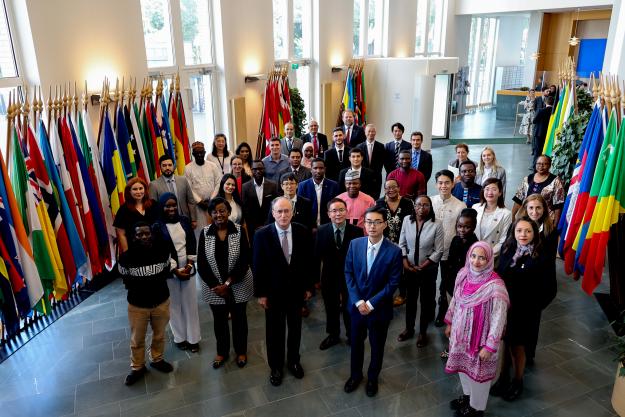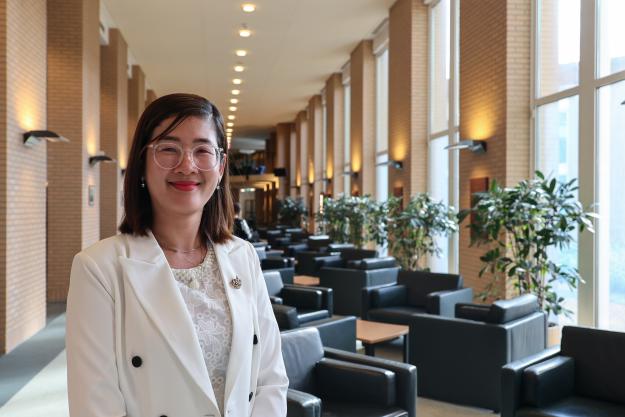
THE HAGUE, Netherlands— 21 December 2022— The Associate Programme of the Organisation for the Prohibition of Chemical Weapons (OPCW) has bolstered the national implementation of the Chemical Weapons Convention (CWC) for the last 23 years and is now accepting applications for its 2023 session.
The Programme’s uniquely focussed and immersive approach is designed for chemists and chemical engineers from Member States with economies that are developing or in transition. During the nine-week course, participants enhance their knowledge of the CWC and develop skills in the fields of chemical engineering, integrated chemical management, and chemical and security within the context of the chemical industry.
The intense residential programme combines theoretical and practical segments, with a focus on chemical safety and security, chemical business operations and group research projects with mentorship by OPCW staff members. A portion of the training takes place at OPCW Headquarters in The Hague, Netherlands, with the university segment and industrial attachments held at different Member States.
Programme costs, including travel, accommodation, meals, course fees, and medical and travel insurance are covered by OPCW.
For many participants the Associate Programme is a steppingstone on their career path in fields that uphold the Chemical Weapons Convention nationally and internationally. To date the 545 Associate Programme alumni are spread around the world, working in industry, government, academia, and even at the OPCW Technical Secretariat to ensure that chemistry is used exclusively for peaceful purposes.

Regional statements by participants drew attention to the holistic impact of the programme. Ms Lilit Poghosyan of Armenia, representing the Eastern European region stated: “[The programme] has given us an immeasurable of practical knowledge about the CWC, the main principles and activities of the chemical industry and how to create thinking environments in our workplaces.”
Mr. Louie Intalan of the Philippines described the richness of the programme, stating: “… we were trained to be better listeners, communicators, and leaders,” while Ms. Janaiba Saneeh of the Gambia noted the programme’s role in gender mainstreaming and providing support to African region: “The high representation of women in this programme is a step [in the right direction] towards breaking gender barriers in chemistry.” In 2022, the Associate Programme had participants from the following Member States: Argentina, Armenia, Belarus, Botswana, Brazil, Cambodia, Cameroon, Chile, Colombia, Cuba, Gambia, Ghana, India, Iraq, Kenya, Malawi, Mauritius, Niger, Nigeria, Pakistan, Philippines, Sierra Leone, Somalia, Tanzania, Uganda, Uzbekistan, Vietnam.
The 2023 Associate Programme will take place from 21 July to 22 September 2023 and is now open for applications. Applicants must be nationals of an OPCW Member State, be able to understand, read, and communicate clearly in English, have a first degree (BSc or equivalent) in chemistry or in chemical or process engineering, and have a minimum of five years’ relevant work experience. Details on the application process and requirements are available here. The application deadline is 10 February 2023.
Voices from 2022 Associate Programme graduates

Diana Carolina Castaneda Torres
Analytical chemist in the Chemical Forensic Laboratory of the National Police of Columbia
“My work was focused on criminal incidents, but the Associate Programme helped me understand the importance of industry verification, the movement of chemicals around the country and role of declarations. The programme prepared me, as a member of the National Police, to respond to many different situations, including those that could occur at Columbian ports. Now I’ll be providing technical support to trainers at a national and regional trainings. Controlled substances can do a lot of damage and we are trying to keep the country safe. This training has changed my view of the chemical industry and my professional life. I plan to keep learning and educating myself to help not just my country, but the people and the community where I live.”

Joshua Hussein
Chemical inspector at the Government Chemist Laboratory Authority of the Ministry of Health of Tanzania
“As a chemical inspector, I conduct inspections of chemical shipments at the Namanga border between Tanzania and Kenya. I inspect for safety and security issues related to all industrial chemicals, including scheduled and non-scheduled chemicals. In some ways, we’re doing at a local level what the Chemical Weapons Convention does at the global level. I applied for the OPCW Associate Programme to learn how we can improve our local regulations.
Dar es Salam is one of the biggest ports in Africa, serving six additional neighbouring countries. The Associate Programme has helped me see how to equip fellow inspectors and chemical dealers, including small-scale entrepreneurs, with knowledge on these topics so they can really understand issues of chemical safety and security.”

Sandy Tith
Chief of Chemical Protection and coordination for international organisations at the National Authority of Cambodia
“The practical part of the Associate Programme was immensely useful. It will help me be part of the escort team for OPCW inspections in Cambodia. During the programme, my research project focused on checking new chemical compounds that may be harmful for us but are not yet controlled, specifically the comparison of synthesis of nerve agents and psychoactive compounds. It’s important for me and my colleagues at the National Authority to understand that some chemicals can be weaponised and need to be monitored and regulated. Now I’m prepared to share what I’ve learned with my colleagues and those at other ministries.”
Background
OPCW supports its Member States in the peaceful use of chemistry as mandated under the Article XI of the Convention (economic and technological development). Capacity building under Article XI focuses on integrated chemicals management, laboratory capabilities enhancement, and promotion of chemical knowledge.
The Associate Programme is the flagship capacity building of the OPCW and throughout the 22 previous editions of the Programme, the OPCW has trained over 540 people from 121 Member States.
So far, over 20 former participants have joined the Secretariat as staff members and several of them serve as the members of Secretariat’s Science Advisory Board.
As the implementing body for the Chemical Weapons Convention, the OPCW, with its 193 Member States, oversees the global endeavour to permanently eliminate chemical weapons. Since the Convention’s entry into force in 1997, it is the most successful disarmament treaty eliminating an entire class of weapons of mass destruction.
Over 99% of all declared chemical weapon stockpiles have been destroyed under OPCW verification. For its extensive efforts in eliminating chemical weapons, the OPCW received the 2013 Nobel Peace Prize.
